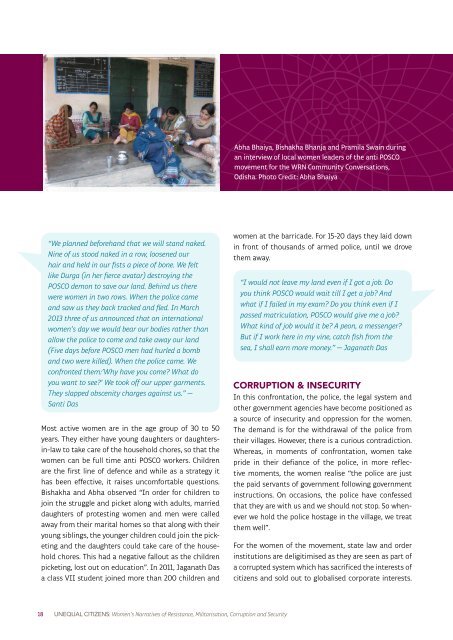CC_India
CC_India
CC_India
Create successful ePaper yourself
Turn your PDF publications into a flip-book with our unique Google optimized e-Paper software.
Abha Bhaiya, Bishakha Bhanja and Pramila Swain during<br />
an interview of local women leaders of the anti POSCO<br />
movement for the WRN Community Conversations,<br />
Odisha. Photo Credit: Abha Bhaiya<br />
“We planned beforehand that we will stand naked.<br />
Nine of us stood naked in a row, loosened our<br />
hair and held in our fists a piece of bone. We felt<br />
like Durga (in her fierce avatar) destroying the<br />
POSCO demon to save our land. Behind us there<br />
were women in two rows. When the police came<br />
and saw us they back tracked and fled. In March<br />
2013 three of us announced that on international<br />
women’s day we would bear our bodies rather than<br />
allow the police to come and take away our land<br />
(Five days before POSCO men had hurled a bomb<br />
and two were killed). When the police came. We<br />
confronted them:’Why have you come? What do<br />
you want to see?’ We took off our upper garments.<br />
They slapped obscenity charges against us.” —<br />
Santi Das<br />
Most active women are in the age group of 30 to 50<br />
years. They either have young daughters or daughtersin-law<br />
to take care of the household chores, so that the<br />
women can be full time anti POSCO workers. Children<br />
are the first line of defence and while as a strategy it<br />
has been effective, it raises uncomfortable questions.<br />
Bishakha and Abha observed “In order for children to<br />
join the struggle and picket along with adults, married<br />
daughters of protesting women and men were called<br />
away from their marital homes so that along with their<br />
young siblings, the younger children could join the picketing<br />
and the daughters could take care of the household<br />
chores. This had a negative fallout as the children<br />
picketing, lost out on education”. In 2011, Jaganath Das<br />
a class VII student joined more than 200 children and<br />
women at the barricade. For 15-20 days they laid down<br />
in front of thousands of armed police, until we drove<br />
them away.<br />
“I would not leave my land even if I got a job. Do<br />
you think POSCO would wait till I get a job? And<br />
what if I failed in my exam? Do you think even if I<br />
passed matriculation, POSCO would give me a job?<br />
What kind of job would it be? A peon, a messenger?<br />
But if I work here in my vine, catch fish from the<br />
sea, I shall earn more money.” — Jaganath Das<br />
CORRUPTION & INSECURITY<br />
In this confrontation, the police, the legal system and<br />
other government agencies have become positioned as<br />
a source of insecurity and oppression for the women.<br />
The demand is for the withdrawal of the police from<br />
their villages. However, there is a curious contradiction.<br />
Whereas, in moments of confrontation, women take<br />
pride in their defiance of the police, in more reflective<br />
moments, the women realise “the police are just<br />
the paid servants of government following government<br />
instructions. On occasions, the police have confessed<br />
that they are with us and we should not stop. So whenever<br />
we hold the police hostage in the village, we treat<br />
them well”.<br />
For the women of the movement, state law and order<br />
institutions are deligitimised as they are seen as part of<br />
a corrupted system which has sacrificed the interests of<br />
citizens and sold out to globalised corporate interests.<br />
18 UNEQUAL CITIZENS: Women’s Narratives of Resistance, Militarisation, Corruption and Security


